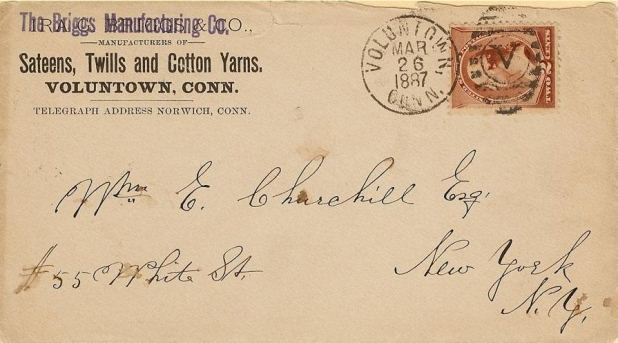The Briggs Manufacturing Company was the premier employer in Voluntown, Connecticut, throughout the latter half of the 19th century. Building on the success of pioneers like Samuel Slater in nearby Jewett City (which today is a part of Griswold), Briggs took advantage of the country’s emerging technological infrastructure and Voluntown’s abundant water supplies to establish a cotton mill that typified the experiences of many New England textile mills of the era.
The Textile Industry Boom
Aided by the technological advancements of the Industrial Revolution, many New England towns situated along waterways established textile mills throughout the 19th century. By the time the Briggs Manufacturing Company opened for business in 1856, many areas of Connecticut already hosted a thriving textile industry.
Like many of its competitors, Briggs shared in the industry’s prosperity for the better part of the century. By 1888, the company had assets of $100,000 and operated approximately 15,000 spindles spread out over 3 different mills. Briggs boasted 200 employees who, combined, earned $36,000 per year.
Pachaug State Forest take Root on Cotton Company Land
By the start of the 20th century, despite the proliferation of agriculture in Voluntown, Briggs remained the principle source of income for most local families. Unfortunately for these families, the manufacture of cotton in New England became less and less profitable, and the industry began to decline. Rising prices for raw cotton made the material increasingly difficult to obtain. In addition, rising wages in other industries increased pressure on cotton factories to keep pace—raising expenses even further. Many cotton manufacturers began curtailing production, operating for shorter periods of time, and even ceasing operations for months at a time to save costs.
In the 1920s, Briggs operated two mills in Voluntown and two in Jewett City, employing approximately 250 people. The decline of the cotton industry forced the company to cease operations at two of its plants in 1924 and operate the other two only 4 days per week. Two years later, “owing to the depression in the cotton industry,” the directors at Briggs voted to cease operations altogether and sell the company’s assets. Among the assets liquidated were 1,100 acres of property later reborn as part of Pachaug State Forest in 1928.









